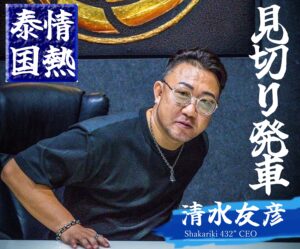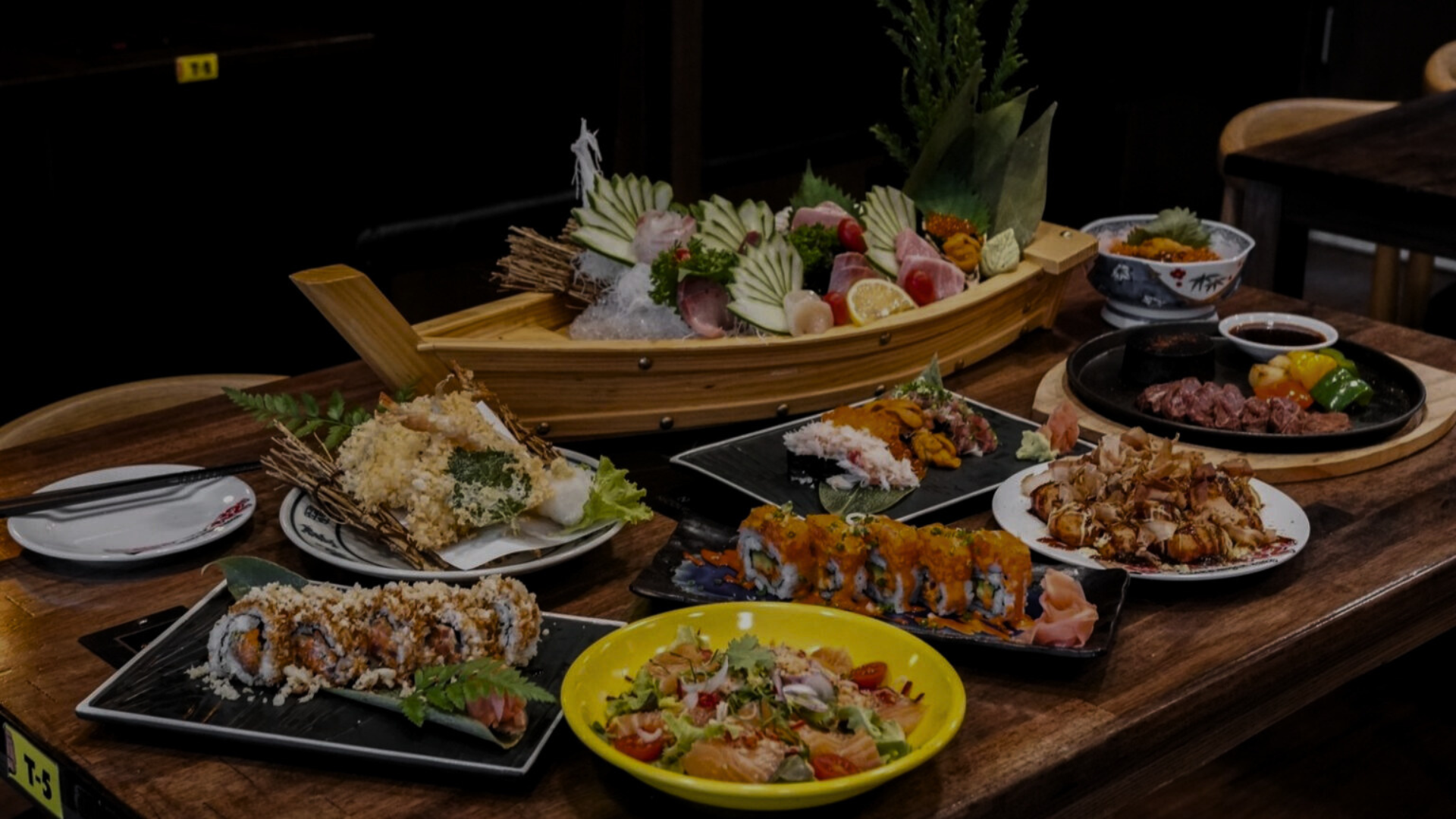HISTORY
After graduating from high school, I enrolled in a vocational school. However, due to my edgy personality, I encountered conflicts with my seniors and left after three months. I then began working full-time at a traditional Japanese kappo restaurant.
After two years, I reunited with a junior high school classmate at a coming-of-age ceremony and got married. Following marriage, I worked as a truck driver during the day and took a part-time job at an izakaya restaurant at night.
At the age of 26, I was scouted by a yakiniku restaurant that my family frequently visited and took on the role of manager. However, due to store circumstances, I left after three months. Around this time, I began to consider the idea of opening my own restaurant.
Despite having no prior knowledge of management and lacking skills in customer service and communication, I believed, “If I try, I’ll succeed!” With this mindset, I opened the first Shakariki 432’’ store in my hometown of Noda. Using 6 million yen saved over six years, the initial store, which had 30 seats, was managed by myself, my wife, and two part-time workers. Although the first few months were challenging, through numerous trials and errors based on my motto, “act quickly after thinking of something,” and with support from customers, staff, and my wife, the store became profitable within a year. It gained even more popularity after hiring regular customers who wanted to work with us.
Two years and three months after opening the first store, I expanded by opening a second store in Shin-Fukushima. Following that, I continued opening stores in Umeda, Namba, and Ohiraki. During this period, I became overly ambitious, and those times eventually took a toll.
My primary concern was managing staff. As the number of employees grew and stores began operating without my direct involvement, I found myself missing the enjoyable aspects of customer service, such as engaging with and entertaining customers. Moreover, one staff member, whom I allowed to become independent, opened a similar store nearby, leading to trust issues with my team. Reflecting on this, I realize that my focus on rapid expansion without establishing a solid foundation led to a decline in staff loyalty and company appeal.
This was an inevitable outcome. I believe that my current self is shaped by these experiences. I realized the importance of building strong relationships with staff. To make matters worse, Ohiraki store was destroyed by a fire, the Noda store faced eviction, and the Umeda store encountered financial difficulties, prompting me to sell them. In the end, only the Noda second store and the Shin-Fukushima store remained.
During this time, I considered expanding into Thailand with 10 million yen, inspired by my visits to the country and its positive attributes, such as the ease of sourcing ingredients, the character of Thai people, and living comfort. I felt that Bangkok resembled Osaka. In December 2011, I decided to pursue this opportunity and conducted market research in Thailand for one month starting January 2012. With no local contacts, I visited Japanese restaurants to gather information. I moved to Thailand in May 2012 and opened the “Shakariki 432’’” Asok store in July.
Opening the first store in Thailand was filled with enthusiasm, but I faced numerous challenges, such as ventilation issues, air conditioner malfunctions, and local police troubles. Despite the tough start, thanks to the dedication of my staff, sales steadily increased. The timing for expanding into Thailand was truly perfect. It was at this moment that I once again realized how crucial it is to act at the right time.
My approach is to use company savings to invest in the next step. Thus, I not only expanded my own stores like “Shakariki 432’’” and “Shakarich,” but also entered franchise agreements with Japanese and Thai food brands, including “Nikusho,” “Towa no Tofu,” “Tenyo Ramen,” “Joto Curry,” and “Tokumasa Curry Udon,” to broaden our presence in the Thai market. Currently, we operate 22 Shakariki 432’’ stores (15 directly managed and 7 franchised), 2 Shakarich stores, 1 Nikusho store, 1 Towa no Tofu Cafe & Hotel, and 5 combined Tenyo Ramen, Joto Curry, and Tokumasa Curry Udon stores, along with 2 stores each in Malaysia and Cambodia. We are also planning to expand into additional countries, continually embracing new challenges.
CEO INTERVIEW

Why do you keep opening new branch?
Because I do not have any debts. I cannot get a loan easily as Japan. That is good for me. Even though, if I ever went bankrupt, I won’t get any minus. I do not have any stresses or pressure for opening new branches. So, if you have a good location, please let me know. And I would like to built the system that I was failed in Osaka.
What is the key for success?
I have never thought of myself as successful in this company. I believe I did not miss the opportunity and help from people around me. If I saw some people looking for job, I ask the person to work with me. I did not miss the chance. The timing is very important. I have communication problem with Thai employees. However, I did not miss the timing. I was surprised with Thai people’s high communication ability. I had hard time to explain the Japanese food but I could enjoy the situation from my character. Thai people drink a lot and eat a lot more than Japanese. Our Thai customers unit price is higher than Japanese. I succeed to get Thai customer through the Facebook advertisement. I posted not only promotion but also I posted unique and funny things too such as Moai statue and Otokomae beer.
Could I have a word to Young people who wants to independent?
Gathered the courage and took a step forward. As long as someone support you, do not give up the challenge. You can grab the chance. I failed in Japan because of I had never made the rules as company. I want to provide a good work environment for employees.

